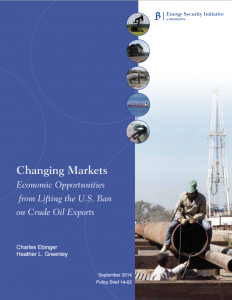Full Title: Changing Markets Economic Opportunities from Lifting the U.S. Ban on Crude Oil Exports
Author(s): Charles Ebinger and Heather L. Greenley
Publisher(s): Brookings Institution
Publication Date: September 1, 2014
Full Text: Download Resource
Description (excerpt):
The skyrocketing growth of unconventional oil and natural gas production in the United States has ignited an intense debate on the impact of energy exports on U.S. energy and economic security and its foreign policy. Today, rising U.S. crude oil production, combined with declining demand for petroleum products, has led to falling oil imports and increased product exports (which are not prohibited). The absence of logistics systems for many of these new crude oil sources has forced domestic producers to discount prices in order to get them to refineries, while at the same time having to endure higher-cost rail, barge, and truck transportation networks. The market is distorted further by the fact that a large volume of these new crude oil supplies are light sweet crudes which are ill-suited for many existing refineries designed to process heavy crude oil, in the absence of large-scale capital investments. There is intense analytical debate on when the capacity of the U.S. refining system to process the entire volume of light tight oil available will end, the so called “day of reckoning.” Few market observers, including the authors of this report, doubt that the day is coming. If this happens, there will be a mix of pressures on prices: downward pressure on domestic oil prices; slowing domestic production; rising unemployment; and declining tax and royalty revenues for federal, state, and local governments. The market harbinger that a glut is emerging will be widening spreads in the price of Louisiana Light Sweet crude (LLS, the Gulf Coast price marker) against Brent prices (the international marker for the same quality of crude). When that day comes, there will be pressure on the United States to act, to avoid the self-inflicted harm of artificially constraining crude oil exports.
